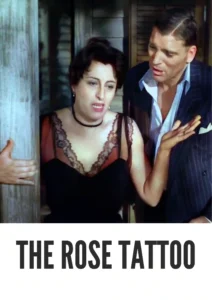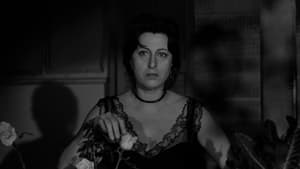Contact: info@alwanfilm.com
Video Sources 0 Views
- Watch trailer
- The Rose Tattoo


Synopsis
Table of Contents
ToggleThe Rose Tattoo 1955 Colorized: A Melodramatic Masterpiece – A Review

Introduction
In the heart of classic cinema lies “The Rose Tattoo,” a captivating tale of love, loss, and redemption that continues to resonate with audiences today. Released in 1955, this timeless masterpiece has been revitalized with an early colored version, inviting viewers to experience its emotional depth in a vibrant new light. In this review, we delve into the significance of the film’s early colored rendition, exploring how colorization adds a new dimension to “The Rose Tattoo” and cements its place in cinematic history.
Check The Full Colorized Movies List
Check Our Colorized Movies Trailer Channel
Understanding The Rose Tattoo 1955 Colorized: Director, Cast, and Genre
Directed by Daniel Mann, “The Rose Tattoo” is a testament to the power of storytelling and the enduring allure of classic melodrama. At its helm is the iconic Anna Magnani, whose portrayal of Serafina Delle Rose captivates audiences with its raw emotion and depth. Magnani is joined by an ensemble cast including Burt Lancaster and Marisa Pavan, whose performances elevate the film to new heights. Blending elements of romance, tragedy, and redemption, “The Rose Tattoo” transcends genre conventions to deliver a timeless cinematic experience.
Exploring the World of The Rose Tattoo 1955 Colorized: Plot and Characters
Set in a small Italian-American community in the Gulf Coast, “The Rose Tattoo” follows the journey of Serafina Delle Rose, a grieving widow whose life is forever changed by the arrival of a charismatic truck driver. As Serafina grapples with her grief and longing, she discovers the healing power of love and the strength to embrace life once more. Through its richly drawn characters and emotionally resonant storyline, “The Rose Tattoo” offers a poignant exploration of love, loss, and the transformative power of forgiveness.
The Art of Film Colorization
Colorization has emerged as a powerful tool in the cinematic arsenal, offering filmmakers the opportunity to breathe new life into classic films and engage contemporary audiences in fresh and innovative ways. By infusing black-and-white footage with vibrant hues and textures, colorization adds depth and dimension to the visual narrative, immersing viewers in the richly textured world of the film. While some purists may question the necessity of colorization, others see it as a valuable means of preserving and revitalizing cinematic treasures for future generations to enjoy.
Early Colored Films: A Brief History
The history of colorization is a testament to the evolution of cinematic technology and innovation. From the earliest experiments with hand-tinted films to the advent of Technicolor and Eastmancolor, the emergence of colorization has transformed the visual landscape of cinema, offering filmmakers new avenues for artistic expression and creativity. As the technology continues to advance, so too does the potential for colorization to shape the future of filmmaking and storytelling.
The Rose Tattoo 1955 and Its Early Colored Version
The decision to release “The Rose Tattoo” in an early colored version marks a bold departure from tradition, offering audiences a fresh perspective on this timeless classic. By infusing the film with vibrant hues and textures, colorization enhances the visual impact of “The Rose Tattoo” and immerses viewers in its richly textured world. Whether experienced in its original black-and-white format or its early colored rendition, “The Rose Tattoo” remains a powerful and unforgettable cinematic experience.
The Debate Over Film Colorization
The debate over film colorization reflects broader discussions about art, authenticity, and cultural heritage. While some argue that colorization detracts from the original artistic vision of a film, others see it as a valuable means of preserving and reimagining cinematic classics for modern audiences. As filmmakers and audiences continue to grapple with questions of authenticity and artistic integrity, the debate over film colorization remains as vibrant and contentious as ever.
Examining The Rose Tattoo 1955 as an Early Colored Film
For fans of classic cinema, the early colored version of “The Rose Tattoo” offers a fresh and immersive viewing experience. From the sun-drenched shores of the Gulf Coast to the vibrant hues of Serafina’s rose garden, colorization enhances the visual beauty of the film and immerses viewers in its richly textured world. Whether viewed in its original black-and-white format or its early colored rendition, “The Rose Tattoo” stands as a timeless testament to the enduring power of love and redemption.
Influence and Legacy: The Rose Tattoo 1955 Colorized’s Impact on Cinema
“The Rose Tattoo” has left an indelible mark on the landscape of cinema, inspiring generations of filmmakers and captivating audiences with its timeless appeal. Its influence can be seen in the countless melodramas that have followed in its wake, as well as in the enduring popularity of Magnani’s performance. The film’s early colored version has also contributed to its legacy, sparking conversations about the role of colorization in preserving and reimagining cinematic classics for modern audiences.
Director’s Cinematic Legacy: Beyond The Rose Tattoo 1955 Colorized
Daniel Mann’s legacy extends far beyond “The Rose Tattoo,” with the director leaving an indelible mark on the world of cinema. His innovative storytelling techniques, keen eye for detail, and distinctive visual style have earned him a place among the pantheon of great filmmakers. Mann’s influence can be seen in the work of directors who have been inspired by his unique approach to storytelling, ensuring that his legacy will endure for generations to come.
Themes Explored in The Rose Tattoo 1955 Colorized
At its core, “The Rose Tattoo” is a film about the human condition and the universal quest for love and redemption. Themes of grief, longing, and forgiveness pervade the narrative, as Serafina Delle Rose grapples with her grief and finds the strength to embrace life once more. Through its heartfelt storytelling and emotionally resonant characters, the film offers a powerful meditation on the nature of love, loss, and the enduring bonds of family.
Reception and Controversy Surrounding The Rose Tattoo 1955 Colorized
Upon its release, “The Rose Tattoo” received widespread critical acclaim, with audiences and critics alike praising its powerful storytelling and stellar performances. Anna Magnani’s portrayal of Serafina Delle Rose was particularly lauded, earning her an Academy Award for Best Actress. However, the film was not without its controversies, with some critics questioning the decision to release it in an early colored version. Despite these debates, “The Rose Tattoo” remains a beloved classic of American cinema, revered for its timeless appeal and enduring impact.
Where to Watch The Rose Tattoo 1955 Colorized Online
For cinephiles eager to experience “The Rose Tattoo” in all its glory, the film is readily available on popular streaming platforms such as Amazon Prime, iTunes, and Google Play. Whether viewed in its original black-and-white format or its early colored rendition, “The Rose Tattoo” promises to captivate audiences with its timeless storytelling and unforgettable performances.
FAQs About The Rose Tattoo 1955 Colorized
Q: Is “The Rose Tattoo” available in its original black-and-white format?
A: Yes, “The Rose Tattoo” is available in both its original black-and-white format and an early colored version, allowing viewers to choose their preferred viewing experience.
Q: What makes “The Rose Tattoo” such a timeless classic?
A: “The Rose Tattoo” is revered for its powerful storytelling, unforgettable performances, and timeless themes of love, loss, and redemption. Its enduring appeal lies in its ability to resonate with audiences on a deeply emotional level, transcending the boundaries of time and culture.
Conclusion
In conclusion, “The Rose Tattoo” stands as a timeless classic of American cinema, revered for its powerful storytelling, unforgettable performances, and enduring impact on the landscape of film. Whether viewed in its original black-and-white format or its early colored edition, the film continues to captivate audiences with its raw emotion, atmospheric direction, and haunting storyline. As debates about film colorization continue to unfold, “The Rose Tattoo” serves as a shining example of the transformative power of cinema, ensuring its legacy will endure for generations to come.















